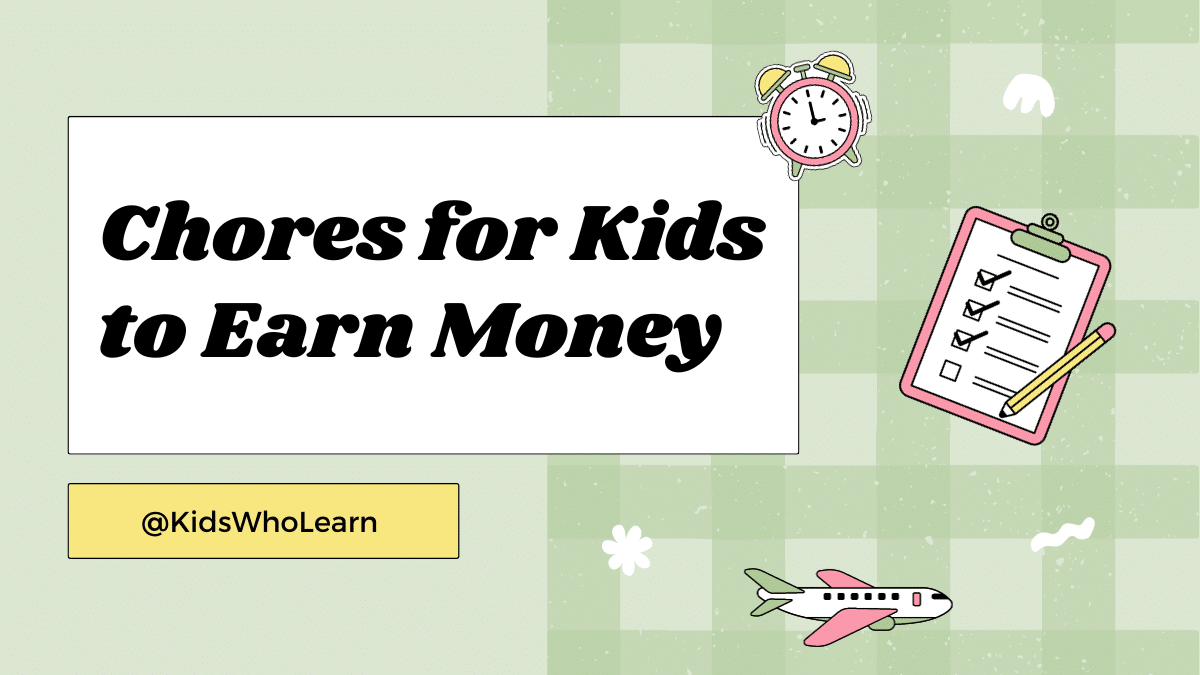Are you a parent looking for a way to teach your kids about money management? One way to do this is by assigning them chores and allowing them to earn money for completing them. Not only does this teach them the value of hard work, but it also gives them a sense of responsibility and independence.
There are many different types of chores that kids can do to earn money. Some examples include cleaning their room, doing the dishes, taking out the trash, and washing the car. By assigning these tasks and offering a monetary reward, you are teaching your kids that money is earned through hard work and effort. Additionally, they will learn the importance of budgeting and saving their earnings for future expenses.
Overall, assigning chores for kids to earn money is a great way to teach them important life skills while also helping out around the house. It’s important to set clear expectations and guidelines for completing the chores, as well as establishing a fair payment system. With a little bit of effort and consistency, you can help your kids become responsible and financially savvy individuals.
Understanding the Value of Money
Teaching Kids About Money
As a parent, it is important to teach your kids about money. One way to do this is by giving them an allowance for doing chores around the house. This will help them learn the value of money and how to manage it.
When giving your kids an allowance, make sure to explain to them how much they will be receiving and what they can do with the money. You can also teach them how to save their money by setting up a savings account for them.
Importance of Earning Money
It is important for kids to understand the value of earning money. By doing chores around the house, they can earn money and learn the importance of hard work. This will also help them develop a sense of responsibility and independence.
When kids earn their own money, they will learn how to manage it and make smart decisions with their finances. They will also learn the value of saving and budgeting.
Overall, teaching kids about money is an important life skill that will benefit them in the long run. By understanding the value of money and how to manage it, they will be able to make smart financial decisions as they grow older.
Chores for Younger Kids
If you want to teach your kids about the importance of hard work and responsibility, assigning them household chores is a great way to start. Not only will it help them develop a sense of accomplishment, but it can also be an opportunity for them to earn some extra pocket money. Here are some age-appropriate and safe chores that your younger kids can do:
Age-Appropriate Tasks
It’s important to assign tasks that are appropriate for your child’s age and abilities. Here are some ideas for tasks that younger kids can do:
- Putting away toys
- Dusting low surfaces
- Helping to set the table
- Watering plants
- Sweeping small areas
- Folding towels and washcloths
- Sorting laundry
- Helping to feed pets
These tasks are simple and easy to complete, and they can help your child feel like they are contributing to the household.
Safe and Fun Chores
It’s also important to make sure that the chores you assign are safe and fun for your child. Here are some ideas for safe and enjoyable chores:
- Cleaning windows with a spray bottle and squeegee
- Wiping down surfaces with a damp cloth
- Helping to wash the car with a bucket and sponge
- Raking leaves into a pile
- Helping to make a simple meal or snack
- Sweeping outdoor areas like a porch or patio
- Folding and putting away their own clothes
By assigning safe and fun chores, you can help your child learn important life skills while also having fun and feeling like a valuable member of the family.
Chores for Older Kids
If you are an older kid looking to earn money, there are plenty of chores you can do around the house. Here are some ideas for household responsibilities and outdoor tasks that you can take on.
Household Responsibilities
- Cleaning the Bathroom: This is a task that many parents dread, so they may be willing to pay you to do it. Your responsibilities could include scrubbing the toilet, cleaning the sink and shower, and wiping down the mirrors. Make sure to use the appropriate cleaning supplies and wear gloves to protect your hands.
- Washing Dishes: If your family doesn’t have a dishwasher, you could offer to wash the dishes by hand. This includes scraping off any leftover food, washing the dishes with soap and water, and drying them off. You could also offer to load and unload the dishwasher if your family has one.
- Laundry: Doing laundry can be a time-consuming task, so your parents may be willing to pay you to do it. This includes sorting the clothes, washing them, and putting them away. Make sure to follow any special instructions for different types of clothing.
- Vacuuming and Dusting: Keeping the floors and surfaces clean is important for a healthy home. You could offer to vacuum the carpets and rugs, sweep the floors, and dust the furniture. Make sure to use the appropriate tools and techniques for each surface.
Outdoor Tasks
- Mowing the Lawn: If your family has a lawn, you could offer to mow it for them. This includes trimming the edges and cleaning up any clippings. Make sure to use the appropriate safety gear, such as ear protection and closed-toe shoes.
- Watering Plants: If your family has a garden or plants that need watering, you could offer to take care of them. This includes watering them regularly and checking for any signs of pests or disease.
- Raking Leaves: During the fall season, there may be a lot of leaves on the ground that need to be raked up. You could offer to do this for your family, including bagging up the leaves and disposing of them properly.
- Cleaning the Pool: If your family has a pool, you could offer to clean it for them. This includes skimming the surface for debris, brushing the walls and floor, and checking the chemical levels. Make sure to follow any safety guidelines and wear appropriate clothing.
By taking on these chores, you can earn money while also helping out your family. Make sure to negotiate a fair price with your parents and communicate any questions or concerns you may have.
Setting Up a Payment System
When it comes to paying your kids for doing chores, it’s important to have a clear and consistent payment system in place. Here are some tips for setting up a payment system that works for your family.
Allowance vs Pay Per Chore
One decision you’ll need to make is whether you want to give your child a set allowance each week or pay them per chore. There are pros and cons to each approach.
An allowance can help teach your child about budgeting and saving, as they’ll have a set amount of money each week to work with. However, it may not provide enough incentive for your child to do chores consistently.
Paying per chore can motivate your child to work harder and earn more money, but it may not teach them about managing money as effectively as an allowance would.
Consider your family’s values and goals when deciding which approach to take. You may even want to try both and see which works best for your child.
Creating a Chore Chart
Once you’ve decided on a payment system, it’s time to create a chore chart. This will help your child know what tasks they need to complete and how much they’ll earn for each one.
You can create a simple chart using a whiteboard or poster board, or use an app or online tool to track chores and payments. Be sure to include the following information:
- Chore name
- How often it needs to be done (daily, weekly, etc.)
- How much it’s worth
- Who is responsible for completing it
Make sure the chart is visible and easy to read, so your child can stay on track and know what they need to do to earn money.
By setting up a clear payment system and chore chart, you can help your child learn about responsibility, money management, and the value of hard work.
Benefits of Earning Money Through Chores
When it comes to teaching kids about money, there are many different approaches you can take. One popular method is to encourage kids to earn money through chores. While this may sound like just another way to get kids to do housework, there are actually many benefits to this approach.
Developing Work Ethic
One of the biggest benefits of earning money through chores is that it helps kids develop a strong work ethic. When kids are paid for their work, they start to see the value of their time and effort. This can be a powerful motivator to work harder and take pride in their work.
To help reinforce this idea, it’s important to set clear expectations for what is expected of them and to provide feedback on their performance. This can help kids understand what it takes to do a good job and how to improve over time.
Promoting Responsibility
Another benefit of earning money through chores is that it promotes responsibility. When kids are paid for their work, they start to see themselves as contributing members of the household. This can help them develop a sense of ownership and responsibility for their actions.
To help reinforce this idea, it’s important to involve kids in the decision-making process. This can include setting goals for what they want to earn and how they plan to spend their money. By involving kids in these decisions, you can help them develop a sense of responsibility and accountability.
Overall, earning money through chores can be a great way to teach kids about the value of hard work and responsibility. By setting clear expectations and providing feedback, you can help kids develop a strong work ethic and a sense of ownership over their actions.
Potential Drawbacks and Solutions
Overemphasis on Material Rewards
It is important to remember that the purpose of paying children for chores is to teach them the value of money and hard work, not to spoil them with material rewards. Overemphasizing the payment aspect of chores can lead to a sense of entitlement and a lack of intrinsic motivation to help out around the house.
To avoid this, it is important to balance payment with praise and recognition for a job well done. Consider creating a chore chart with a mix of paid and unpaid tasks, and make sure to show appreciation for all completed tasks, regardless of whether or not they are paid.
Balancing Chores and Free Time
Another potential drawback of paying children for chores is that it can lead to an imbalance between work and play. Children need free time to relax and have fun, and if they are constantly focused on earning money through chores, they may become stressed and overwhelmed.
To avoid this, make sure to set clear expectations and boundaries around chore time and free time. Consider setting a limit on the number of paid chores per week, or designating specific days as “chore-free” days. Encourage your child to find a balance between work and play, and make sure to provide plenty of opportunities for them to relax and have fun outside of chore time.
Conclusion
In conclusion, assigning chores to your kids is a great way to teach them responsibility and the value of hard work. By offering them the opportunity to earn money, you are also teaching them about financial responsibility and budgeting.
Remember to keep the chores age-appropriate and to set clear expectations and guidelines. Encourage your kids to take ownership of their tasks and to complete them to the best of their ability.
By using a chore chart or schedule, you can help your kids stay organized and accountable. Consider offering bonuses or incentives for exceptional work or for going above and beyond their assigned tasks.
Overall, assigning chores to your kids not only helps you out around the house but also sets them up for success in the future. So, get started today and watch your kids grow into responsible and hardworking individuals!








I love all these ideas . Thank you for providing these amazing information. 🙌🏻 awesome job🙌🏻
Thanks, Carmen!